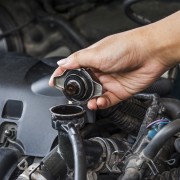Many take a well-working car for granted and ignore minor issues until they become major ones. You can help prevent engine trouble with these tips and tricks for engine maintenance.
- Browse Categories
- All Tips
-
Home & Garden
- All
- Appliances
- Bathroom
- Cleaning
- Crafts
- Decorating
- Electrical
- Flooring
- Furniture
- Garage Door
- Gardening
- Green Living
- Heating
- Home Alarm Systems
- Home Maintenance
- Home Remedies
- Home Security
- Home Staging
- House Sitting
- Junk Removal
- Kitchen
- Lawn Care
- Lock Systems
- Moving
- Outdoor Living
- Pest Control
- Plumbing
- Renovation
- Roofing
- Snow Removal
- Storage
- Tools
- Tree Service
- Health
- Family
- Travel
- Auto
- More Tips

Easy fixes for car engine issues
September 15, 2015

There’s a knocking coming from the engine
Check your oil and fuel
If your engine is knocking, pinging or chattering, you may need to look at your choice of fuel. Try a higher octane fuel — these are often sold under a name like "Premium" or "Super" and cost a little more than basic fuel. Low oil levels can also cause engine noise — check the level and top off if required.
Make it last
Top up your fluids
The single most important thing you can do to add life to your car and prevent repairs along the way is to maintain the correct levels of all the fluids under the hood. It's good practice to check their levels once a month.
Check your oil:
- Park your car on a level surface. Turn off the engine and wait at least 15 minutes. Pull out the dipstick (which usually has an orange or yellow hooped handle), wipe it with a clean cloth and reinsert it completely.
- Wait five seconds, then pull it up again. Check the oil level relative to the MIN and MAX marks engraved on the dipstick. If the level is below MIN, find and unscrew the oil cap. Pour in the correct oil, a little at a time.
- Wait 30 seconds before checking the level with your dipstick again, as above.
- Stop before you reach the MAX mark — overfilling with oil could damage the engine.
Check your other fluids:
- The coolant, brake fluid, windshield wiper fluid and other fluids under the hood are held in translucent reservoirs, marked with correct filling levels, so you easily see if they need a refill.
- Follow the manufacturer's instructions on topping off these fluids.
- Engine oil used in most modern cars is classed as "multigrade." This type of oil is thinner at cold temperatures than when the engine warms up, helping the oil to flow to protect the engine when you start up from cold.
- Multigrade oils are described by two numbers, such as 10W-30; these figures indicate the oil's viscosity when cold and when warm. When topping off, you should use the oil specified for the make and model of your vehicle.
My engine squeals
Use soap on the belt for a quieter drive
Car engines use rubber belts — or more usually today, a single broad belt known as the serpentine or poly-V belt — to supply power to systems such as the water pump and the air conditioner. If this belt slips on its pulleys, it'll make a high-pitched squeal.
- Switch off your engine and allow it to cool. Press down on the top of the belt. If it is so loose that you can push it down by more than one centimetre (a half inch), it needs to be tightened or replaced by a mechanic. However, you can temporarily silence the squeals.
- Use a knife to cut a thin slice from a bar of soap. Rub the soap on the inner surface of the belt along as much of its length as you can reach (having a thin slice of soap helps you reach further).
- Start the engine and check for squeals. Repeat the process if necessary.






